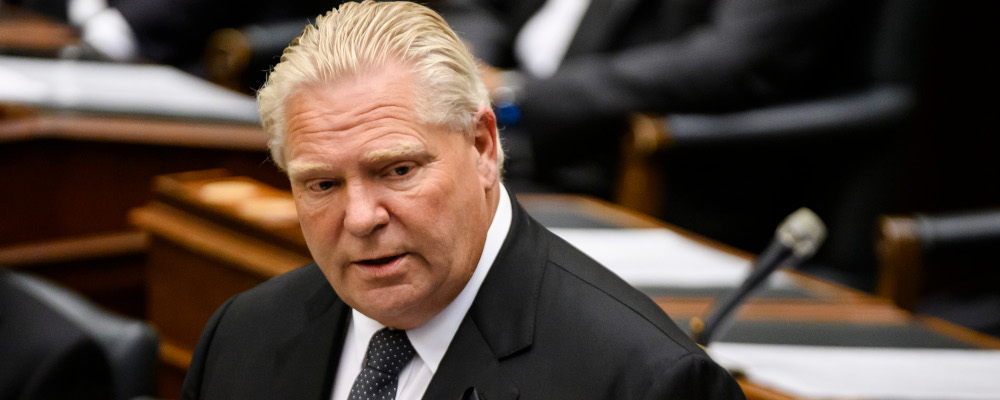The reaction to the Ontario government’s decision to cloak legislation that would avert school closures in that province in the notwithstanding clause has once again revealed that many of us have yet to fully grapple with the underlying reasons why the clause is so contentious.
Many of us have come to adopt a stance toward the notwithstanding clause that essentially reflects our political preferences. If the clause is used to support a policy outcome we support or used by a party we endorse, the clause is a commendable tool in the legislature’s toolbox. At least for today. The next time might be a different story.
Where the clause, however, is used by our political opponents or used to protect policy outcomes with which we disagree, we might find ourselves disagreeing with that use of the clause. In those scenarios, it is not uncommon for individuals decrying a particular use of the clause to also decry its existence in our constitutional order—again, at least for today.
In fairness, some people oppose the existence of the notwithstanding clause no matter what day of the week it is. And some people generally endorse the clause. But these voices strike me as a minority compared to the crowd described above. At the very least, the perspectives of these voices tend to be drowned out by that crowd. As a result, our discourse on the merits and demerits of the notwithstanding clause is impoverished whenever it comes up for debate.
Pierre Trudeau was one of these principled voices. He opposed the clause outright and only with the greatest reluctance allowed it to be added to the Charter when it became clear that, without the clause, there would be no Charter at all. Trudeau’s opposition to the clause boiled down to a fear that it would be abused by legislatures to mute basic rights and freedoms. He worried that the clause could lead to a Canada with a hollow bill of rights.
It is unclear to me whether Trudeau envisioned legitimate uses of the clause, but it does not seem farfetched to imagine him agreeing that there could be. If a judge’s ruling on a novel Charter issue would invalidate legislation that serves a compelling interest and enjoys broad public support, I suspect Trudeau might not condemn the use of the clause to rescue that legislation—at least in certain cases.
This is essentially what happened in Saskatchewan in 2017 when a court ruling on the legality of the province funding the attendance of non-Catholic pupils in Catholic schools would have led to massive disruption in the school system had the province not responded by invoking the clause to maintain the status quo. Where courts reach what a government considers to be a questionable result in a constitutional case or a result that conflicts with the common good, the notwithstanding clause offers governments a path to a different destination.
Even so, legislatures might deploy the notwithstanding clause in an attempt to clinch the constitutionality of legislation that is considered by many to be profoundly problematic. The case of Quebec’s Bill 21, which forbids many public servants in that province to wear religious symbols at work, effectively cordons off parts of the public square for religious citizens. Bill 21 is, in my view, a law unbecoming of a society that claims to respect human rights.
This reaction to Bill 21 is revealing with respect to the propriety of the notwithstanding clause. At the root of this reaction is a desire for laws to be fundamentally just. The clause draws so much ire, in other words, because it can be complicit in the creation of unjust laws.
This revelation is significant and troubling, but we should resist the temptation to think that the notwithstanding clause is itself intrinsically unjust or that every use of it is automatically unjust. Our focus should be on the substance of the law and whether it respects fundamental justice.
We should also recognize that, absent the applicability of any other constitutional rules, a procedurally sound invocation of the notwithstanding clause is entirely constitutional. Setting aside the wisdom of this reality, the fact is that the notwithstanding clause is a part of our Constitution. A particular use of the clause may seem to us deeply unjust, and may in fact be deeply unjust, but that does not necessarily mean it is unconstitutional.
All of that being said, it appears that we have not sufficiently wrestled with the fact that the notwithstanding clause engages a longstanding legal and philosophical debate over whether unjust laws lack the system requirements to be considered valid laws and the related debate of whether unjust laws deserve to be obeyed.
To be clear, it seems absurd to suggest that the provincial premiers who advocated for including the clause in the Charter were interested in creating a mechanism by which they and their successors could oppress their citizens. The historical record reveals that these advocates viewed the clause as a means to retain a measure of autonomy from the courts should the courts interpret the Charter in a way that the provinces deemed unsatisfactory in relation to matters like education, health care, development of natural resources, and so forth.
Perhaps the advocates of the clause also thought that judges are not uniquely equipped to interpret a bill of rights and that legislatures have distinct features that might aid the pursuit of this project. The proper handling of rights and freedoms in a pluralistic society is nuanced and challenging even in the easiest of cases. Maybe there is something to be said about having more rather than fewer cooks in this particular kitchen.
In the end, the debate on the notwithstanding clause may hinge on whether having a mechanism that enables the enactment of unjust laws is an acceptable risk even if the same mechanism can also be used to achieve sensible, albeit Charter-sensitive, policy outcomes.
Pierre Trudeau emphatically believed that this was not a risk worth taking. Others disagree. Still others, myself included, have decidedly mixed feelings on the matter.
One thing is certain: controversy around the notwithstanding clause will not disappear anytime soon. The debate on the clause should be informed and thoughtful, but at times it almost has the flavour of a bar fight. We should take this debate outside and to the café across the street.
Recommended for You

‘Uncertainty costs money’: Can Canada attract the investment needed to build major energy projects?

‘A populist, nationalist movement’: What is AmericaFest—and why should Canadians be paying attention?

Bondi Beach is a warning Canada cannot ignore

Are younger Canadians getting their fair share? It’s time to have a serious talk about the CPP




